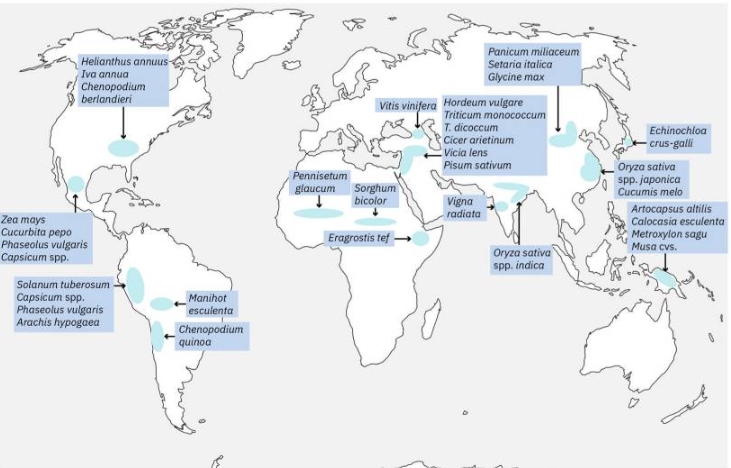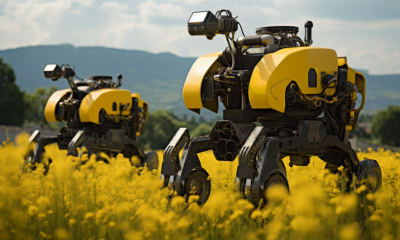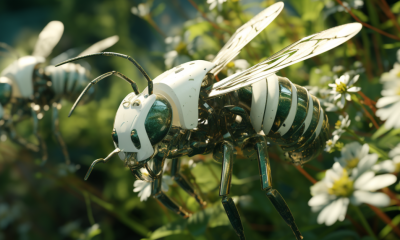Agriculture
Advancing Agriculture with AI and Genetic Engineering – The Future of Cultivation
Securities.io is not an investment adviser, and this does not constitute investment advice, financial advice, or trading advice. Securities.io does not recommend that any security should be bought, sold, or held by you. Conduct your own due diligence and consult a financial adviser before making any investment decisions.

Creating New Food Crops
Since the dawn of agriculture, mankind has turned wild weeds into domesticated crops, which have higher nutritional content, better taste, are easier to harvest, and have larger seeds.
However, modern breeding of food crops has resulted in selection for traits like a stronger response to fertilizer, pesticides, and irrigation, resulting in more fragile varieties that are dependent on high-input agricultural systems.
Climate change, soil erosion, invasive species, and weeds have created strong pressure on these over-selected crops.
This process of domestication was also slow and “blind”, with new traits randomly discovered and selected over decades if not centuries.
Most of the world's crops come from a handful of “domestication events” in a few regions of the world, leaving plenty of possible domestication to be done.
For now, new selection and breeding procedures of crops by agricultural firms have been focused on adding traits like water-stress resistance or pest and disease resistance to modern crops, with mixed results.
The main issue is that a lot of these desirable traits identified in wild species are multigenic, created by many genes, often dozens or even hundreds of them, making genetic modification of cultivated crops close to impossible.
Another option is emerging, called “de novo domestication”. The idea is that instead of taking high-yield modern crops and trying to make them as resistant as wild weeds, why not take already resistant wild weeds and make them as productive as modern crops?
New Crops And New Problems
Creating New Food Sources
The traits desirable in a cultivated crop variety tend to be less complex, often directed by just one or a handful of genes. In addition, these genetic features are generally well understood.
So, the de novo domestication approach has the potential to produce new types of crops that could display resistance to environmental shifts and good enough yield and characteristics as food.
Especially when you take into account new tools like CRISPR, that allow for very specific and controlled gene editing, including adding and removing a gene, or editing specific bases of an existing gene. Considering that CRISPR is now being approved for gene therapies in humans, it is likely that the legal framework for CRISPR-edited crops will open up in many countries.
The technical details of how it could be done can be found in scientific publications, for example, “Future-Proofing Agriculture: De Novo Domestication for Sustainable and Resilient Crops”.
Getting Lost In The Weeds
An issue that arises by turning weeds into food crops is that, obviously, the new crops will be very similar to weeds. In the article “De novo domestication: what about the weeds?”, researchers at the University of Copenhagen looked at this question.
In it, they admit that the traditional GMO approach to weed management (herbicide resistance) is unsustainable and causes too much pollution.
Instead, they propose that robotic weeding technology could be boosted by genetic engineering to create a much more environmentally friendly weed management system.
When Advanced Robotics Meet Advanced Gene Editing
Robots Weeding Fields
The de novo crops (and potentially, modified existing crop varieties as well) could be modified to make their identification easy for weeding robots.
This could be a boon for farming robots, a topic we discussed in our article “Investors Should Take Note: Robotics Is Taking Over Farming”, where we presented a variety of weeding robots:
- Ecorobotix’srobot combines machine vision with precision spraying to reduce by up to 95% the volume of pesticide and herbicide used.
- Naio Technologies aims to remove herbicide from the field fully, with a 5-ton autonomous robot driving the field and shredding or uprooting the weeds with small blades. It uses LIDAR, GPS guidance, and machine vision to drive by itself and distinguish crops from weeds, requiring no supervision.
- Blue River Technology, a partner of the giant in farming equipment John Deere. It uses machine learning and machine vision to identify every plant in the field. So the robot can get rid of the weed but also thin out the crops, like lettuce, increasing the overall yield without human intervention.
Intelligent Vision
This last use of machine vision by Blue River is a growing trend among farming robotic companies, with others pursuing the same strategy, like Vision Robotics, Ekobot, Carbon Robotics, and Aigro.
Overall, they leverage the progress made in AI that is also used for self-driving cars, delivery robots, etc.
The issue is that even humans can have trouble distinguishing some weeds from crops. So, even with the most advanced machine learning and neural networks, simple visual identification can struggle to identify the target correctly.
This problem will be even more serious for de novo domestication strategies, with modified weeds looking very similar to the original wild weeds, even more than conventional crops.
In theory, these problems could be solved by developing more efficient or powerful algorithms. However, no one knows yet if this is truly feasible. Genetic modifications could come to the rescue.
Tagging De Novo Crops
Contrary to the human eye, machine vision can easily analyze a wide range of the electromagnetic spectrum, spanning the visible (380–780 nm), near-infrared (780–2500 nm), mid-infrared (2500–25 000 nm), and far-infrared (25 000–300 000 nm) ranges.
When combined together, this is known as “hyperspectral” vision. This is already a technology used for analyzing crops, using hyperspectral images from drones or satellites to detect problems like water stress, pests and diseases, soil quality, etc.

Source: Imechyperspectral
The new crops and genetically edited plants could be engineered to have a different hyperspectral profile than their wild cousins. This difference could then be used by the robots to decide instantaneously which is the weed and which is the desired crop.
Genetic engineering could also be used to modify the shape of the leaves, making the de novo domesticated crops even easier to identify.

Source: Cell
The beauty of this approach is that a change in the hyperspectral profile is unlikely to change any of the environmental fitness of the plant. So it is a change that would likely not be detectable in any meaningful manner except by the weeding robots.
Lastly, changes in the hyperspectral profiles can be achieved with mono-gene modification, and are routinely performed in plant biology labs already, so they do not require new technological progress: the Danish researchers list no less than 17 known gene modifications known to achieve the desired results.
The Best Approach?
Bioengineering crops has been a topic of debate for many years. The most common use of this technology, adding herbicide resistance traits, has not helped make the practice more popular, as it has been linked to increased herbicide usage, including the potential cancer-causing RoundUp.
At the same time, virtually every cultivated crop is genetically heavily modified from its wild ancestors, the only difference is that these differences were achieved through random instead of directed mutations.
A problem seen with herbicide-resistant GMOs has been the spread of herbicide-resistant weeds. Similar issues may arise with crops modified for their hyperspectral profile.
This should, nevertheless, not distract from the promise of de novo domestication.
This approach could create new food crops more resistant to drought, salination, heat waves, diseases, and pests.
It could also even allow us to create new staple crops (like wheat and rice) that are not annual but perennial, regrowing every year, capturing carbon, and limiting soil erosion, like for example African wild rice or the newly bred perennial hybrid grain Kernza®.

Source: Frontiers
Innovative Farming Companies
1. Deere & Company
This publicly traded company is known for its traditional agricultural machinery. It is also a leader in the most advanced farming pieces of machinery, deploying technologies such as AI, IoT, robots, machine learning, big data, etc., to make data-driven decisions.

Source: Deere
As mentioned above, Deere is also partnering with startups like Blue River Technology, using machine vision to identify every plant in the field.
So, it is likely that autonomous tractors/robots and machine vision, maybe applied to de novo domesticated crops, will be John Deere's future, smoothly integrating these technologies into satellite imagery and other AI-driven solutions.
3. Bayer Crop Science (BAYRY)
Bayer Crop Sciences, part of Bayer Global (also a pharmaceutical company), focuses on innovations around seeds and traits and crop protection.
Bayer's innovations have helped its biotechnology scientists to make targeted improvements within plant DNA.
Since its merger with Monsanto, it is also a leader in GMO crops and weed management. This merger came with the problem of very expensive RoundUp lawsuits, which caused the company's stock to tank in the years following the merger.
It controls most of the traditional GMO seed market and is also working on using CRISPR for the next generation of seeds for corn, soybean, wheat, etc.
Crop protection benefits, according to Bayer, are enormous. The crop protection mechanism safeguards around 30 percent of agricultural yields worldwide, equivalent to 550 million tons of food that could feed more than 2 billion people.

Source: Bayer
Bayer is moving from traditional GMOs through a partnership with Gingko Bioworks (DNA), one of the largest synthetic biology companies. The partnership is focused on developing biological alternatives to chemical fertilizers via gene editing of microorganisms.
It is a leader in seed variety and gene editing in plants, with 500+ new crop varieties in its pipeline (and 250 new crop registrations in 2022).
The company is also a leader in integrating technology into farming. For example, Bayer signed a partnership with Microsoft to combine the tech giant's data management system Azur with Bayer's expertise in using data from satellites, field sensors, drones, field equipment, and soil sensors to create truly modern and connecting farms.

Source: Bayer
Thanks to its leadership in GMOs (traditional and advanced gene editing), plant variety selection, and integration of big data into farming, Bayer would be a natural candidate to accompany the process of creating de novo domesticated crops, as well as hyperspectral detection of weed by farming robots.













